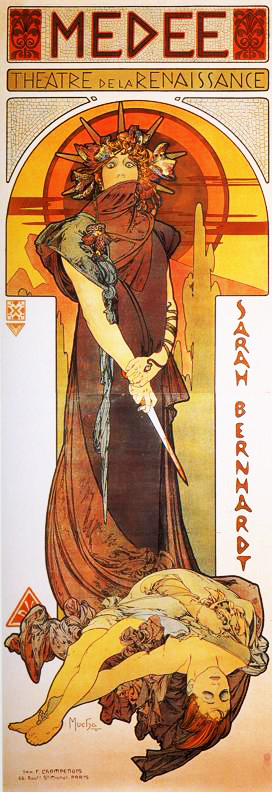One of the posters Mucha designed to advertise the plays of Sarah Bernhardt, Medea or Medee is a dramatic and stark image that retains all the features we expect from an Alphonse Mucha piece, whilst also being darker and more relational than much of his work.
The picture advertised the play of the same name that Bernhardt starred in. This tells the story of Medea, an enchantress who appears in the Greek myths. The granddaughter of Helios (the Sun god), she is most well known as a vengeful scorned woman.
There are many versions of her story, but the basic outline of it is this: she helped Jason to capture the golden fleece on condition that he married her; she was responsible for the deaths of several powerful men who stood in her way including her brother, her uncle and King Pelias; she was abandoned by Jason for Glauce and in revenge she sent Glauce a dress dipped in poison that killed her after which Medea killed two of her own children to spite Jason.
Mucha's portrait captures the savage drama of this story, but also adds to it. Rather than characterising Medea as simply revengeful, Mucha makes her a more rounded personality.
The evidence of her crimes is upon her: one victim lies dead in a poisoned dress at her feet and she holds the bloody dagger her children were killed with.
Yet she appears shocked and terrified by what is happening, wearing an oversize crown that looks like it is weighing her down.
The effect is in contrast to a lot of Mucha's work: this woman is active and the image is full of movement and emotion. She looks directly out of the picture, almost as an appeal for help.




